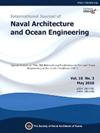小型船舶的有效能量密度:柴油发动机和电池电力推进系统的比较研究
IF 3.9
3区 工程技术
Q2 ENGINEERING, MARINE
International Journal of Naval Architecture and Ocean Engineering
Pub Date : 2025-01-01
DOI:10.1016/j.ijnaoe.2025.100681
引用次数: 0
摘要
由于电力推进系统在减少排放方面的优势,最近引起了相当大的兴趣。然而,在小型船舶上部署电力推进系统需要严格的检查和验证。与其不经考虑就采用电力推进系统,不如在设计阶段对其可行性进行全面评估。提出了一种基于有效能量密度的小型船舶推进系统评价方法。目标是从设计阶段就考虑推进系统设备因素,并评估其对小型船舶的适用性。对gt9.77型渔船蓄电池电力推进系统进行了反设计,并与原柴油机推进系统的有效能量密度进行了比较。研究结果表明,在相同的周航行设计要求下,柴油机推进系统的有效重力能量密度和有效体积能量密度分别是电池电力推进系统的11.95倍和13.14倍。这一发现表明,鉴于当前电池技术的局限性,电池电力推进系统对于长时间航行的渔船来说并不是一个可行的选择。进一步分析表明,在低速、短时工况下,电池电力推进系统的有效能量密度优于柴油机推进系统。研究结果表明,设计阶段基于有效能量密度的评估方法是确定所选推进系统是否适合小型船舶特定应用需求的有效手段。这种方法有助于设计和选择合适的推进系统。本文章由计算机程序翻译,如有差异,请以英文原文为准。
Effective energy density in small vessels: a comparative study of diesel engines and battery electric propulsion systems
The electric propulsion system has recently attracted considerable interest due to its advantages in reducing emissions. Nevertheless, the deployment of electric propulsion systems in small vessels necessitates rigorous examination and validation. Rather than adopting electric propulsion systems without due consideration, it is preferable to conduct a comprehensive evaluation of their feasibility at the design stage. This study proposes an evaluation method for propulsion systems suitable for small vessels based on effective energy density. The objective is to consider propulsion system equipment factors from the design stage and assess their applicability to small vessels. A reverse design of a battery electric propulsion system for a GT 9.77 fishing boat was conducted, and its effective energy density was compared with that of the original diesel engine propulsion system. The findings demonstrate that under identical weekly sailing design requirements, the effective gravimetric energy density and effective volumetric energy density of the diesel engine propulsion system are 11.95 times and 13.14 times greater, respectively, than those of the battery electric propulsion system. This finding indicates that, given the limitations of current battery technology, battery electric propulsion systems are not a viable option for long-duration sailing fishing boats. Further analysis indicates that the effective energy density of the battery electric propulsion system is superior to that of the diesel engine propulsion system under low-speed, short-duration operating conditions. The findings of this study indicate that the evaluation method based on effective energy density at the design stage is an effective means of determining the suitability of a chosen propulsion system for specific application needs of small vessels. This approach facilitates the design and selection of appropriate propulsion systems.
求助全文
通过发布文献求助,成功后即可免费获取论文全文。
去求助
来源期刊

International Journal of Naval Architecture and Ocean Engineering
ENGINEERING, MARINE-
CiteScore
4.90
自引率
4.50%
发文量
62
审稿时长
12 months
期刊介绍:
International Journal of Naval Architecture and Ocean Engineering provides a forum for engineers and scientists from a wide range of disciplines to present and discuss various phenomena in the utilization and preservation of ocean environment. Without being limited by the traditional categorization, it is encouraged to present advanced technology development and scientific research, as long as they are aimed for more and better human engagement with ocean environment. Topics include, but not limited to: marine hydrodynamics; structural mechanics; marine propulsion system; design methodology & practice; production technology; system dynamics & control; marine equipment technology; materials science; underwater acoustics; ocean remote sensing; and information technology related to ship and marine systems; ocean energy systems; marine environmental engineering; maritime safety engineering; polar & arctic engineering; coastal & port engineering; subsea engineering; and specialized watercraft engineering.
 求助内容:
求助内容: 应助结果提醒方式:
应助结果提醒方式:


